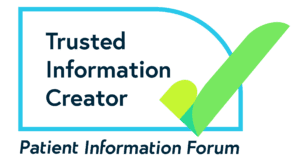A note on terms:
Breast cancer can affect anybody, and everybody is welcome in CoppaFeel!’s community. We’re actively inclusive in our language and we ask people how they want to be described.
The word ‘chest’ is inclusive of all bodies and genders. When we need to be clinically accurate we use the word ‘breast’. You might prefer to call your chest something else, and that’s ok!
What is BRCA?
When we talk about BRCA we mean changes that a person is born with in the cells of genes called BRCA1 and BRCA2. BRCA is a short way of saying BReast CAncer. These changed cells run in families (genetic). They are also known as:
- BRCA gene mutation.
- Hereditary breast cancer.
- Inherited altered gene.
Fewer than 1 in 100 breast cancers are caused by a changed BRCA gene. If you have a changed BRCA gene, your risk of getting breast cancer is between 50% and 90% higher than other people.
We all have genes that protect us against cancer. A changed BRCA gene means one of those genes is faulty. The fault means it can’t repair DNA damage caused by cancer, and the cancer can grow.
Having a changed BRCA gene does not mean you have breast cancer. It does mean your risk of getting breast cancer is much higher than most other people. There are other changed genes that increase the risk of getting breast cancer, but BRCA1 and BRCA 2 are the most common.
Getting Tested for BRCA
If you are worried about a history of breast cancer in your family, talk to your GP. If your GP thinks you could have a changed BRCA gene, they can suggest you are tested. The genetic test for BRCA has 2 steps:
- Your relative with cancer has a blood test. This will check if they have a changed gene. It can take 4 to 8 weeks to get a result for this test.
- If your relative’s test is positive, you can have a blood test at a genetic clinic. This will test to see if you have the same changed gene, and predict your risk of getting breast cancer.
If relatives who have had cancer are not available, you can have the BRCA test if you have at least a 10% chance of having the gene mutation. This usually means you have a very strong history of breast cancer at a young age in your family.
The genetics specialists can work out your risk of getting breast cancer, and they can tell you whether you might need extra screening.
You might start having screening from a younger age. Some people decide to have surgery to reduce their risk. You can talk about all of the different options with a genetics counsellor.
Remember:
Most breast cancers happen by chance. Researchers estimate that only around 5 to 10 out of 100 breast cancers (5 to 10%) are caused by a changed gene.
BRCA Stories
Fole tested positive for the BRCA 2 gene mutation at 24 years-old after 18 months of genetic testing. Knowing her risk of a breast cancer diagnosis was high, she chose to undergo risk-reducing surgery which has given her the freedom to live her life to the fullest.
BRCA in the Jewish community
Having Jewish ancestry increases your risk of having a BRCA gene change- 1 in 40 Ashkenazi Jews and around 1 in 140 Sephardi Jews has a changed BRCA gene, compared to around 1 in 250 individuals in the UK general population.
NHS England is now offering free BRCA gene testing for anyone living in England, aged 18 or over with one or more Jewish grandparent.
For more information visit Jewish BRCA.
Other changed genes:
Here is a list of other changed genes that can increase your risk of getting breast cancer. We are working on this page and we will give you more information soon.
- TP53 gene
- PALB2 gene
- ATM gene
- CHEK2 gene
- STK11 gene
- PTEN gene
BRCA gene FAQs
: If one of my relatives had breast cancer, does that mean I will get breast cancer? Can you get tested for a breast cancer gene?
Breast cancer is the most common cancer in the UK, and people can be affected even if there is no sign of breast cancer in their family.
If you think you have breast cancer in your family, talk to your GP. You may be able to look into your risk, and genetic testing. You can be tested to see if you have a gene which increases your risk of developing breast cancer. The first step is to speak to your GP, they may send you to a genetic testing service who can talk about the options available to you.
Try not to worry if you are starting to look into your risk, it doesn’t mean you will develop breast cancer. You will be able to talk to the specialists about all the options available. For example, some people may be invited to the national breast screening programme at a younger age. It’s always best to be breast aware and be aware of your own body as you know it best.
Visit Cancer Research UK more information on cancer genes in families, and cancer types. Contact your GP if you would like to talk about your breast cancer risk.
Is it possible to get cancer if no one in your family has it?
Yes. 1 in 2 people will be affected by cancer. Most cancers develop as a result of a combination of risk factors. In some cases this includes family history.
We have more information on healthy lifestyle choice and how these can help reduce your risk of breast cancer.
CoppaFeel! Self-Checkout
We updated this information in April 2024. We will look at it again in April 2027.
